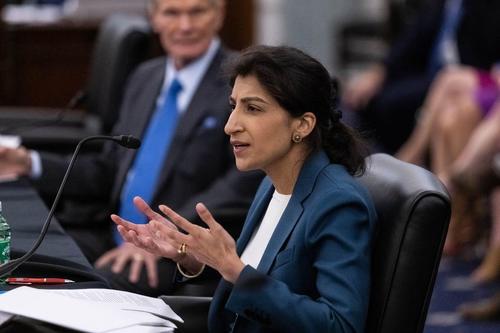Congress Is Empowering FTC's Lina Khan To Start Breaking Up Big Tech
Like Bloomberg's Joshua Brustein pointed out in a column published earlier, as a general rule, FTC appointments don't attract much press interest. And yet the confirmation of Lina Khan as a member of the FTC, and subsequent announcement from the White House that she would be tapped to lead the Commission, has proved a notable exception.
More than four years have passed since Khan wrote her groundbreaking paper criticizing the present American anti-monopoly legal framework, arguing that policies and laws must change for the US to keep big tech from destroying jobs, cornering markets and hoovering up profits. It was that paper, "Amazon's Antitrust Paradox," that caught the Trump Administration's attention, and set Khan on the path to lead the reform of the FTC, as support for breaking up Big Tech grows on both sides of the aisle.
Khan's confirmation, as we explained the other day, suggests that we will likely see even more antitrust action against Big Tech, beyond the flurry of lawsuits filed by the DoJ in partnership with various states AGs and the FTC.
But as Businessweek's economics editor Peter Coy pointed out in a recent column, Congress is already hard at work empowering Khan with a flurry of new bills that could dramatically reshape the legal landscape where antitrust law is concerned. As Khan once reportedly told Coy via email, "if the laws are misinterpreted by courts, Congress is the only actor that can fix their mistakes."
History will likely characterize Khan's confirmation to lead the FTC as a milestone for American anti-trust law, but as Coy points out, it's only the second-most-important development on that front this past week.
Because while Khan's nomination was still making its way through the final Senate votes, five bills were introduced on June 11 by a handful of House Democrats and Republicans. They vary in the extremes of what's being promised, but some of them, should they become law, could force companies like Apple and Amazon to exit certain businesses.
Even more important may be the five bills introduced on June 11 by House Democrats and Republicans that would, among other things, force Amazon.com, Apple, and other tech giants to sell or exit key businesses. The bills would toughen merger reviews for tech companies, prohibit them from offering certain products and services, and restrict how they treat other businesses that depend on their platforms.
According to Bloomberg’s story on the legislation, one of the House bills, the “Ending Platform Monopolies Act,” would prohibit tech platforms from owning a business that competes with other products or services offered on the platform. Such a provision, if passed, would bar Amazon from selling its own branded products, Amazon Basics, for example, or Apple from offering Apple Music, or Google from providing specialized search services in travel, local businesses, and shopping.
Taken as a whole, the legislation “would lead to the biggest reform of competition laws in the U.S. since the first antitrust statutes were passed in the late 19th century,” wrote my Bloomberg colleagues, David McLaughlin and Rebecca Kern.
For more on the "Ending Platform Monopolies" Act, readers can find the text here. Suffice to say, the bill, which would redefine the limits of American anti-trust law, would leave Khan with tremendous powers. And Big Tech is already marshaling its army of lobbyists and dark money-backed NGOs to try and stop this from happening.
Per BBG, NetChoice, a trade organization for Big Tech, is arguing that Khan will "politicize" enforcement of antitrust laws: "Our federal agencies, and the commissioners that serve them, should be neutral and impartial arbiters of economic analysis, rather than political bodies trying to change American law. Legislating and lawmaking is and must remain the duty of our congressional representatives, nowhere near the halls of our nation’s agencies. Sadly, the nomination of an activist to the Federal Trade Commission threatens its long-standing impartiality."
Too bad antitrust has become one of maybe a handful of issues - this, and ensuring American remains competitive against a rising China - that will bring Democrats and the GOP together.
https://ift.tt/3wyfTlq
from ZeroHedge News https://ift.tt/3wyfTlq
via IFTTT


0 comments
Post a Comment